|
|
|
Sort Order |
|
|
|
Items / Page
|
|
|
|
|
|
|
| Srl | Item |
| 1 |
ID:
124645
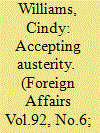

|
|
|
|
|
| Publication |
2013.
|
| Summary/Abstract |
On March 1, 2013, the U.S. Department of Defense lost $37 billion overnight to sequestration. The cut marked the first wave of a series of planned cutbacks that will shrink future budgets across the federal government by about $1 trillion over nine years. The reductions had been set in motion back in 2011, when a special "super committee" established by the Budget Control Act (BCA) failed to reach a deficit-reduction agreement, triggering automatic cuts designed to punish both parties. Unlike other budget cuts, sequestration is implemented across the board, taking the same percentage bite out of every account. Except for the decision to spare the military personnel account that provides the pay for the United States' men and women in uniform, defense leaders had no choice about where to take the 2013 cuts. And so, with just seven months left in the fiscal year, sequestration abruptly erased about eight percent of the the Pentagon's budget for the year.
|
|
|
|
|
|
|
|
|
|
|
|
|
|
|
|
| 2 |
ID:
124650


|
|
|
|
|
| Publication |
2013.
|
| Summary/Abstract |
The United States is now in a period of austerity, and after years of huge increases, the defense budget is set to be scaled back. Even those supporting the cuts stress the need to avoid the supposedly awful consequences of past retrenchments. "We have to remember the lessons of history," President Barack Obama said in January 2012. "We can't afford to repeat the mistakes that have been made in the past -- after World War II, after Vietnam -- when our military policy was left ill prepared for the future. As commander in chief, I will not let that happen again." Similarly, then Secretary of Defense Leon Panetta told Congress in October 2011, "After every major conflict -- World War I, World War II, Korea, Vietnam, the fall of the Soviet Union -- what happened was that we ultimately hollowed out the force. Whatever we do in confronting the challenges we face now on the fiscal side, we must not make that mistake."
|
|
|
|
|
|
|
|
|
|
|
|
|
|
|
|
| 3 |
ID:
130971
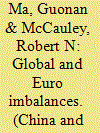

|
|
|
|
|
| Publication |
2014.
|
| Summary/Abstract |
We analyze global and euro area imbalances by focusing on China and Germany as large surplus and creditor countries. In the 2000s, domestic reforms expanded the effective labor force, restrained wages, shifted income toward profits and increased corporate saving. As a result, the Chinese and German current account surpluses widened, and that of Germany has proven more persistent, with subdued domestic investment. China is an early-stage creditor, holding a short equity position and a long position in safe debt. Germany's balanced net debt and equity claims mark it as a mature creditor that provides insurance to the rest of the world. China pays to lay off equity risk, while Germany, by contrast, harvests a moderate yield on its net claims. In both economies, the shortfall of the net international investment position from cumulated current account surpluses arises from exchange rate changes, asymmetric valuation gains, and, in Germany's case, credit losses.
|
|
|
|
|
|
|
|
|
|
|
|
|
|
|
|
| 4 |
ID:
133421


|
|
|
|
|
| Publication |
2014.
|
| Summary/Abstract |
The global banking system is the fundamental conduit of value within nations and across borders. Since the last global financial crisis, however, the role of banks as a repository of value has come increasingly into question. Today, with a fragile recovery in so much of the world, banks and those who manage and regulate them are under attack. We asked our panel of global experts how this crisis of confidence is playing out in their nation or region.
|
|
|
|
|
|
|
|
|
|
|
|
|
|
|
|
| 5 |
ID:
133278
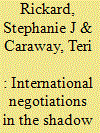

|
|
|
|
|
| Publication |
2014.
|
| Summary/Abstract |
This study examines the role elections play in negotiations between states and the International Monetary Fund (IMF). Although loans made by the IMF often require countries to introduce painful austerity measures that provoke a backlash from angry citizens, some governments are able to negotiate more favorable terms than others. Original data on the substantive content of IMF loans show that governments leverage imminent elections to obtain more lenient loan terms. Conditions that require labor market reforms in exchange for IMF financing are relatively less stringent in loans negotiated within six months before a pending democratic election, all else equal. The further away elections are from loan negotiations, the more stringent the labor conditions included in countries' loan programs. Elections give governments leverage in their international negotiations and this leverage is effective even when states negotiate with unelected bureaucrats during times of economic crisis.
|
|
|
|
|
|
|
|
|
|
|
|
|
|
|
|
| 6 |
ID:
127190


|
|
|
|
|
| Publication |
2014.
|
| Summary/Abstract |
After 40 years of oil investments, the UK is now a mature oil province. During these 40 years or so, the UK Government has changed the type of governance it uses to manage its petroleum resources. This paper introduces the theoretical background to two models of mineral resource governance: proprietorial and non-proprietorial regimes. It investigates how adoption any of these two models by the UK Government has historically affected the achievement of the objectives of the UK petroleum fiscal regime. The analysis tracks the changes in the governance of the UK petroleum resources using changes in the average petroleum tax rate, and how this last influenced the achievement of the objectives of the UK petroleum Regime. The findings remain significant for their policy implications. The study concludes that the UK Government adopted a proprietorial type of mineral governance during the period 1975-1982, before changing to a non-proprietorial regime in the period 1983-2000. Since 2000 it has begun to move back towards a proprietorial style of governance. The excessive use of one type of these modes of governance leads to the objectives of the UK petroleum fiscal regime being not met.
|
|
|
|
|
|
|
|
|
|
|
|
|
|
|
|
| 7 |
ID:
124849
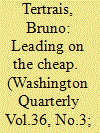

|
|
|
|
|
| Publication |
2013.
|
| Summary/Abstract |
Who would have predicted just two years ago that cash-strapped, inwardly-focused, soul-searching France would embark on a flurry of military operations and bold strategic moves? How France can really afford to remain a global power while imposing some of the heaviest budget cuts ever.
|
|
|
|
|
|
|
|
|
|
|
|
|
|
|
|
| 8 |
ID:
125674
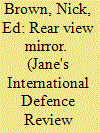

|
|
|
|
|
| Publication |
2013.
|
| Summary/Abstract |
Austerity remained the watchword in defence technology this year, but the world is beginning to change, with some potentially destabilizing new technology in the offing and the growing influence of some non-traditional defence equipment players. The HIS Jane's news team picks some personal themes from a changing year.
|
|
|
|
|
|
|
|
|
|
|
|
|
|
|
|
| 9 |
ID:
132466
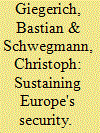

|
|
|
|
|
| Publication |
2014.
|
| Summary/Abstract |
The austerity efforts of European governments following the sovereign debt crisis have reinforced the long-running trend of shrinking defence expenditure in Europe. The need to implement a sustainable spending and budget policy in order to prevent young and future generations from being unduly burdened with debt is often used as the key justification. This argument makes obvious sense. But it isolates financial considerations and budget consolidation from a world in which the uncertainty of developments in the international security realm remains a core feature of international politics. The result is that the goals of financial policy and security policy are increasingly in conflict. Security policy, too, has to be sustainable for the state to discharge its responsibility for the security and freedom of its citizens in the future.
|
|
|
|
|
|
|
|
|
|
|
|
|
|
|
|
|
|
|
|
|